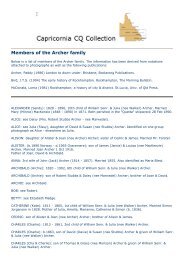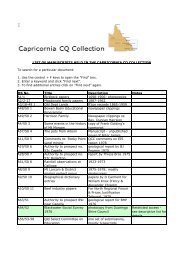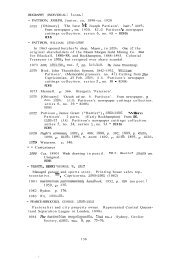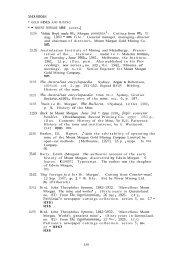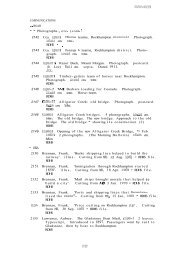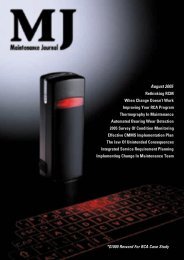April - Library
April - Library
April - Library
You also want an ePaper? Increase the reach of your titles
YUMPU automatically turns print PDFs into web optimized ePapers that Google loves.
The Impact Of Reliability<br />
Centred Maintenance<br />
Daryl Mather Reliability Success P/L (Australia)<br />
As a cornerstone of the maintenance discipline, Reliability Centred Maintenance - RCM can achieve<br />
benefits in a vast number of areas depending on where and how it is applied.<br />
When properly implemented, RCM provides companies with a tool for achieving lowest asset Net<br />
Present Costs (NPC) for a given level of performance and risk.<br />
This implies a cashable impact across a multitude of economic activities, covering both OPEX<br />
(Operational Expenditure) and CAPEX (Capital Expenditure) .<br />
However, RCM will also provide companies with a range of non-cashable advantages that will have a<br />
positive impact throughout the enterprise.<br />
This paper contains a brief description of potential areas of benefit; not the entire range of uses for<br />
RCM. Along with these areas, the author has previously used RCM for capital submissions in regulated<br />
industries,<br />
• to reduce the risk of legal ramifications in management of environmental integrity,<br />
• to establish a tool for contract negotiations related to outsourced maintenance,<br />
• reduction of a company’s carbon footprint,<br />
• and as a means of developing trouble shooting guides<br />
The information in this paper helps alleviate some of the benefits anxiety that often surfaces in the<br />
early implementation stages of large-scale RCM projects, and to provide guidelines for trainee RCM<br />
Analysts.<br />
THE CASHABLE RESULTS OF RCM<br />
Direct cashable benefits from implementing RCM can emerge in every area where maintenance and operations<br />
have an impact.<br />
This can include such disparate areas as increased uptime, decreasing energy usage, reductions in chemical<br />
utilization, or reductions in inventory holdings and routine maintenance spending.<br />
Instead of trying to cover all the potential areas where the method can deliver financial impacts, this section will<br />
focus more on how RCM influences the profit and loss of an enterprise.<br />
This is evident in two principle areas, an increase in potential revenue, and direct cost reductions.<br />
DIRECT COST REDUCTIONS<br />
The main noticeable result of Reliability Centered Maintenance is a dramatic change to the maintenance regimes<br />
that are in place.<br />
John Moubray, a pioneer in this field until his passing, regularly stated that RCM would achieve “a reduction of<br />
between 20% and 70% in routine maintenance where there is an existing scheduled maintenance program.”<br />
Based on the experience of the author, this leads primarily to an increased level of cost-effectiveness of<br />
maintenance, particularly in industries that are very asset intensive.<br />
The team is able to claim benefits in these areas where there is a calculable reduction in the cost of labor,<br />
materials or consumables to perform maintenance (refers to both routine and corrective or reactive activities)<br />
over a reasonable amount of time. (Usually a year)<br />
Logically, these are only potential benefits at the completion of the analysis, as it will take until the first omitted<br />
routine, or the first breakdown requiring reduced resources, before savings begin to accrue.<br />
However, once implemented they can easily be quantified through direct calculation. For this to be accurate there<br />
is a need to quantify both the routine maintenance costs as well as the corrective maintenance costs.<br />
There are some real world limitations on attempting to forecast cost reductions purely through accumulated<br />
data.<br />
The first issue the team can face is that current maintenance regimes often do not exist in the company’s ERP<br />
or CMMS program, or they group them at a high level. Data losses, poor ERP management, and distrust of<br />
10<br />
The Impact Of RCM<br />
AMMJ Vol 24 No 2



